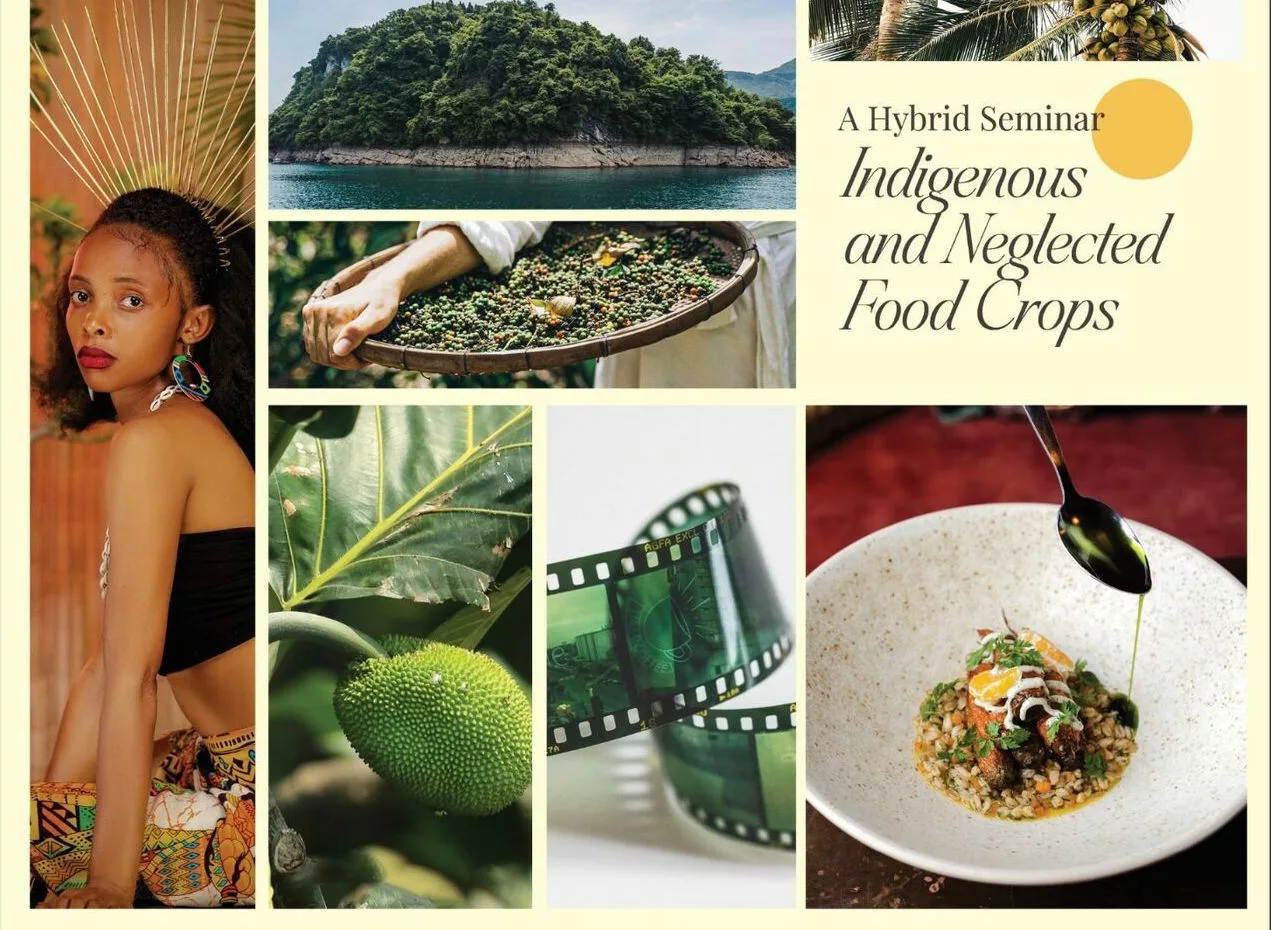8 May 2025. Indigenous and Neglected Crops: A Gateway to Sustainable Tourism and Growth in Africa and the Caribbean
Organized by AgriLuxe Marketing, in partnership with the University of the West Indies (UWI), the University of Johannesburg, and the Food, Agriculture and Natural Resources Policy Analysis Network (FANRPAN), the event centered on discussing a bold new proposal for the first-ever indigenous crop-based tourism circuit connecting Africa and the Caribbean: the AfriCaribbean WILD Tourism Route, targeted to be Wholesome. Indigenous. Local. Diverse.
- The event was covered on a few media platforms, a link to one can be viewed here.
- Dowload the Summary report of this event : Summary Report_Afri Caribbean Indigenous Tourism Route Seminar 18 pp.
This seminar was the first in a series to promote a wider initiative – AfriCaribbean Tourism Routes. Given increasing trends in tourism markets for local, healthy “authentic” culinary and cultural experiences, the tourism routes initiative between Africa and the Caribbean aims to promote the regions as sustainable and unique culinary cultural meccas for both international, regional, and domestic travelers and public and private sector investors. The seminar was in hybrid format (in-person and virtual).
The seminar was chaired by Mr. Jerry Mabena, CEO of the Motsamayi Tourism Group and featured opening remarks and a keynote address from heads of UJ’s School of Tourism and Hospitality, South Africa’s National Agricultural Marketing Council, the Tourism Business Council South Africa, and Africa Tourism Partners.
It highlighted the social, economic, and environmental relevance of indigenous, neglected and under-utilized crops to Africa and the Caribbean. More specifically, to promote these African and Caribbean crops and related value-added foods and products as unique ingredients for developing sustainable tourism.
Entrepreneurs showcased real-world case studies – from indigenous teas and reimagined culinary menus in South Africa, bespoke traditional catering in Zimbabwe, artisanal chocolates by a rural network of African and Caribbean farmers and chocolate producers, founded in Trinidad and Tobago, to farm tours in Grenada, and agricultural-based spa treatments in Barbados. Senior representatives from research institutions and development partners, including the International Institute of Tropical Agriculture, South Africa’s Agricultural Research Council, Afreximbank, the International Finance Corporation, the International Trade Centre, UN Tourism, the Inter-American Institute for Cooperation on Agriculture, and the CARICOM Secretariat, highlighted areas in which they are already partnering and other areas for future collaboration, to support the seminar objectives.
OPENING REMARKS
- Mr. John Steenhuisen, Minister, Department of Agriculture, Republic of South Africa (RSA) (tbc)
- Mr. Tshifhiwa Tshivhengwa, CEO, Tourism Business Council, RSA
- Prof. Diane Abraham, Director, School of Tourism and Hospitality, University of Johannesburg
CONCEPTUAL AND OPERATIONAL FRAMEWORKS
- Ms. Jeanette Sutherland, Founder, AgriLuxe Marketing
BUILDING BRIDGES: STRATEGIES AND LESSONS LEARNED IN CREATING CROSS-BORDER AGRITOURISM ROUTES
- Dr. Lisa Chase, Professor at the University of Vermont Extension, Director of the Vermont Tourism Research Center, past President and current Education Co-Chair of the Global Agritourism Network.
CASE STUDIES: COUNTRY RESPONSES TO FOOD AND WELLNESS TRENDS IN TOURISM MARKETS
- the key markets targeted,
- social and environmental returns on their investments;
- challenges in their supply chains; and
- the role of smallholder farmers and entrepreneurs and how they can be more efficiently incorporated into agritourism value chains.
- Case Study 1: Mr. Michael Daiber, Manager, !Khwa ttu, an award winning San heritage educational center and tourist destination transformed its restaurant menu to tell an indigenous story.
- Case Study 2. Chef Nyanda Peltier Charles, Founder, WATO Festival, Commonwealth of Dominica (celebrating Caribbean local foods and culture)
- Case Study 3: Ms. Gillian Goddard, Co-Founder, Chocolate Rebellion, (an African-Caribbean network of cocoa farmers and artisanal chocolate producers)
- Case Study 4: Ms. Retang Phaahla, Co-Founder, Setšong African Tea Crafters, Limpopo, South Africa) (transforming local flora and fauna into an indigenous brand)
- Case Study 5: Mr. Steve Andrews, Founder, Soothing Touch Spa and The Bamboo Retreat, Barbados (pampering agri-style)
SPECIAL PRESENTATIONS
- Mr. Henry Mathys, Strategic Programme Manager, V&A Waterfront, Cape Town, South Africa.
- Ms. Shadel Nyack Compton, Managing Director, Belmont Estate, Grenada
- Ms. Ena Harvey, Agritourism Specialist
- Ms. Isolina Boto, Head of Networks and Alliances, COLEAD
- Mr. Mark Forgenie, Managing Director, Vista Dorado Estates Moruga Hill Rice
- Mr. Muthuri Kinyamu, Founder, Turn Up Travel and Board Member, Kenya Ecotourism.
- Ms. Hafsah Abdulsalam, CEO, LIAT 2020
- Afreximbank
- Mr. Dave Varty, Co-Founder & Co-Owner, Londolozi Private Game Reserve
- Chef Chaz Brown, Executive Chef at Garces Events
RESPONSES FROM ACADEMIA
- Prof Michael Abberton, Director of the International Institute of Tropical Agriculture (IITA) Genetic Resources Program and Lead for IITA’s work on neglected crops
- Dr Hema Kesa, Director, Food Evolution Research Laboratory and Senior Lecturer at the School of Tourism and Hospitality, University of Johannesburg
- Prof Mark N. Wuddivira, Dean, Faculty of Agriculture, University of the West Indies
- Dr. Yolisa Pakela-Jezile, Acting Executive Manager, Crops and Natural Resources, Agricultural Research Council, RSA
RESPONSES FROM DEVELOPMENT PARTNERS
- Mr. Samuel Kamau Nganga, Manager, Manufacturing, Agriculture and Services, International Finance Corporation
- Mr. William Castro Rodriguez, Sr. Trade Officer, Caribbean Unit, International Trade Centre
- Ms. Sandra Carvao, Director, Market Intelligence, Policies, and Competitiveness, United Nations World Tourism Organisation (UNWTO)
- Ms. Shauna Brandon, Rural Development Specialist, Inter-American Institute for Cooperation on Agriculture (IICA)
- Mr. Jonathan Lewis, Program Manager, Gates Foundation
- Dr. Wendell Samuel, Sr. Advisor to the Secretary General and Acting Assistant Secretary General, Directorate for Economic Integration, Innovation, and Development, CARICOM Secretariat


No comments:
Post a Comment